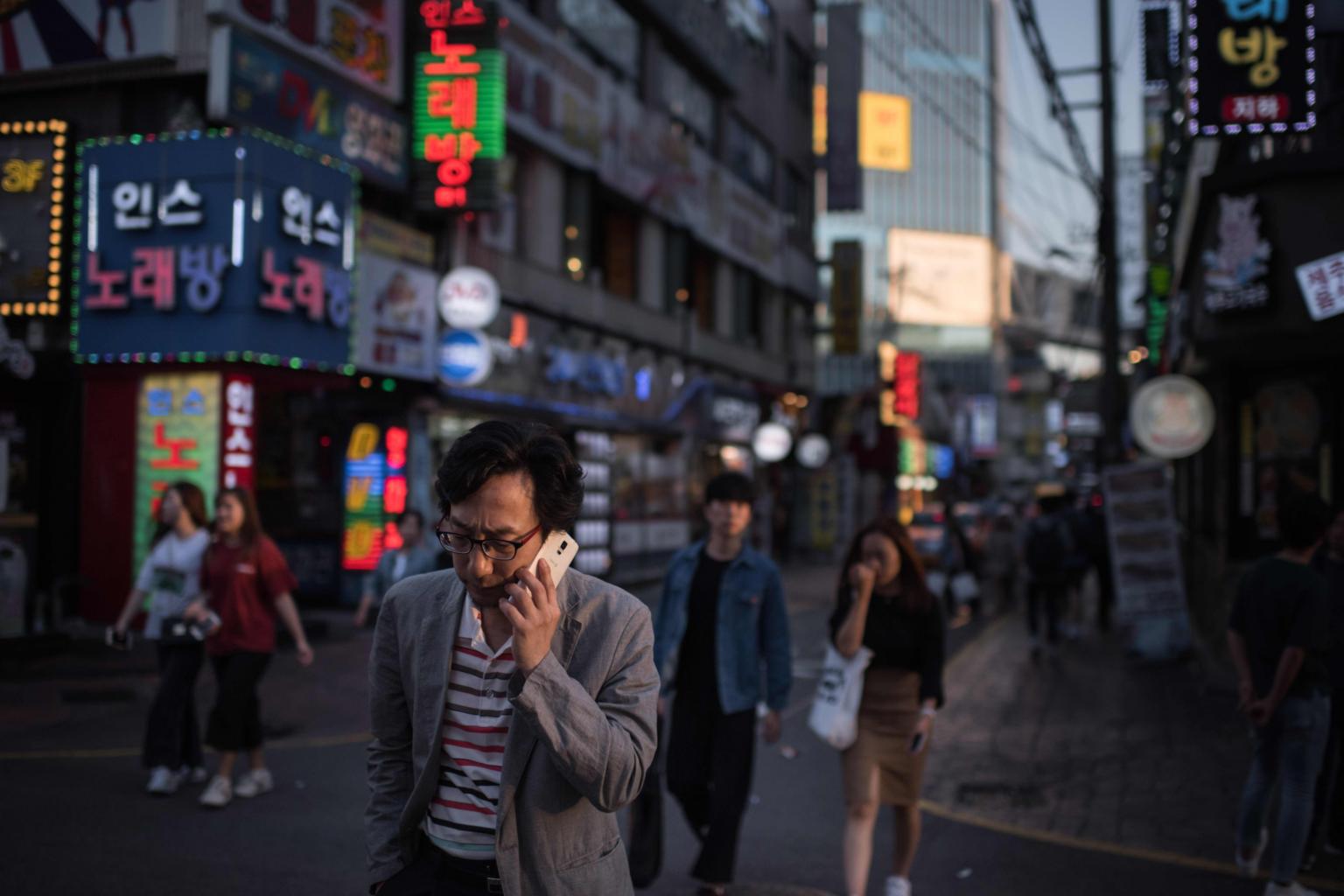The Asian Voice
Is digital connectivity leading to digital servitude?: The Korea Herald columnist
Sign up now: Get insights on Asia's fast-moving developments

A man holds a mobile phone as he walks along a street in the Sinchon area of Seoul on Sept 13, 2017.
PHOTO: AFP
Lee Jae-min
SEOUL (THE KOREA HERALD/ASIA NEWS NETWORK) - The beauty of this glass rectangle is its ability to connect us to anyone, anywhere and anytime. It has freed us from the physical confinement of geographical space. The problem with this shining gadget is also its ubiquitous connectivity: it has freed others as well to reach us anytime and anywhere.
The past 10 years of the smartphone, its cousin tablet and second cousin wrist band have brought about revolutionary changes in our lives.
The connectivity has made virtually everything available at our fingertips. There are so many things indeed that we can do instantly by touching the screens of the small device. Goods are purchased, lives saved and transaction costs lowered.
It is like everyone manages his or her own mobile office and broadcasting facility. You can pretty much create a world of your own. If the invention of the automobile was the first step to enabling human kind to overcome the geographical confinement, the airplane was the second step, and smartphones have finally completed it.
The ubiquitous connectivity for everyone has also made the device one of the most addictive items in our daily lives.
In our hands and pockets, we just cannot resist the temptation of its connection magic. Most probably the first thing I would do after finishing this column is to check my phones. I bet the first thing you would do after reading this newspaper may be the same.
You may be even reading the newspaper with a smartphone right now. Remember the feeling of relief upon touching down in foreign airports when we turn on our phones and find the icons of "3G" or "LTE"? What about the sense of complete loss when we misplace our phones?
This powerful digital connection ironically cuts into "real" connections. In meeting after meeting, easily half the attendees are there but not there -- their minds are traveling to other worlds by checking emails, joining friends on social media, reading newspapers or watching missed - muted -- video clips. They seem to be more interested in what is happening on the other end of the digital connection than the real discussion unfolding in front of them.
In subway trains and on streets, people are absorbed in their own cyber haven with their ears plugged and eyes glued to screens. The easy connectivity also offers the best excuse when there is an awkward silence, say in elevators or at restaurants. We pretend to do something on screens. Of course, I have to confess that I have also done all of the above myself. Under any circumstances, this new connectivity enables us to ignore or flee from the "real" people in "real" situations around us.
The problems of smartphones have been well studied. Accidents on the road and medical symptoms are most commonly mentioned. But the core social problem is the loss -- and facilitation of such loss -- of real connection with the people right beside and just in front of you.
Realisation has burst upon us that we are becoming a prisoner to these new digital devices and their powerful and ubiquitous connectivity.
What an irony it is that the device that frees us is also holding us in servitude.
People are increasingly talking about the new term "digital detox." The concept advises us to turn off smartphones and other digital devices regularly, try to see the "real me" and real people around us, as well as keep the real connection and real conversation in our lives.
It is now 10 years since what was once a hand-held phone became a personal connection device. The digital connectivity that has come with it has become essential and indispensable for us, and is now inseparable from us. But the increasing loss of the "real touch" with real people is prompting us to worry where we will be another 10 years from now. Faster and more convenient lives? A sure thing. Improvement of real quality of life? Questionable, if we let the digital devices control our daily lives.
The writer is a professor of law at Seoul National University.


